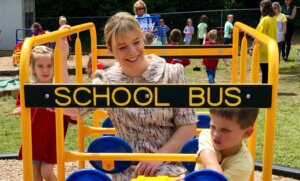Advertiser Editorial:
Expand pre-
kindergarten; it
works
A strong case can be made that Alabama
has the best pre-kindergarten program in
the nation. And a new report by a
respected research organization suggests
that pre-kindergarten programs may be
the best tool for states to address a variety
of education problems, from dropouts to
learning gaps among students. So Alabama
has a lot to be proud of in this regard,
right?Well, not so much.It is true that Alabama has tied with two
other states for having the top pre-
kindergarten programs in the nation in
ratings by the National Institute for Early
Education Research.But that highly touted pre-K program
reaches fewer than one of every 14 eligible
4-year-olds in the state. And that’s a pity,
because pre-K really works.For almost 10 years, the Pew Center on the
States has conducted and monitored in-
depth research on the value of pre-
kindergarten. Last month the center
released a report — “Transforming Public
Education: Pathway to a Pre-K-12 Future”
— that highlights the importance of good
quality pre-K programs.The Pew Center maintains that children
who complete quality pre-K programs are
more academically and socially prepared
when they enter school, less likely to be
held back or need special education
services, and more likely to complete high
school and contribute to their community as
adults.The report states: “The vast body of
evidence shows that quality early learning
helps children succeed in school and in life,
and results in savings to states for every
dollar invested.”That last part — savings for every dollar
invested — is an especially important point
for Alabama’s legislators and other elected
officials to note. That’s because it is money
— or more precisely, the lack of it — that
has stalled the expansion of the state’s
well-regarded pre-K program.To their credit, most Alabama educators
and many state elected officials recognize
Advertisement
the value of top-quality pre-K programs —
hence the development of the existing
program over several years with an
emphasis on maintaining high academic
standards.That is crucial. Pre-kindergarten programs
without such high standards can easily turn
into babysitting classes. Recognizing that
potential pitfall, Alabama rightly focused on
quality and had plans to expand the
program methodically to ensure that the
quality was not lost. But while there has
been some expansion, it has been slowed
to a crawl by the economic downturn.And that’s a shame, not just because of the
students who could benefit from the
programs, but because over time it would
benefit the state’s taxpayers as well.Alabama was a leader in developing a top-
notch program, but it risks falling behind
other states. The Pew Center report notes
that since 2001, funding for pre-K has
more than doubled nationwide. Access has
grown to more than 1 million children, and
other states are improving the quality of
their programs.The Pew Center recommends that pre-K
actually begin for 3-year-olds, and
Alabama’s program is aimed only at 4-
year-olds.Expanding pre-K to reach more children
has to compete with all sorts of other
needs for scarce education dollars, so it is
not realistic to expect the voluntary
program to be made available to all
children in just a year or two.
But the state needs to develop — and
commit to funding — a timetable to have it
available to all 4-year-olds over the next
five years, and to all 3-year-olds within an
additional five years. And if the economy
rebounds, that time frame should be sped
up.
Advertisement
Ads by Pulse 360
AdChoices
Auburn: Dermatologists Hate Her
Local Mom Exposes an Anti-Aging Miracle. Her $5 Trick ERASES Wrinkles!
ConsumerProductsDigest.com
Best Wrinkle Creams of 2011 Exposed
Only one skin cream dominates the others. Click here to find out which wrinkle cream won every time
www.dermapurebeauty.com
1 Tip To Relieve Joints In 7 Days.
Experience Joint Comfort And Relief In 7 Days By Following This 1 Breakthrough Scientific Tip.
More…






